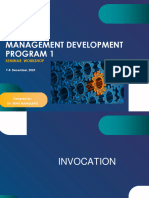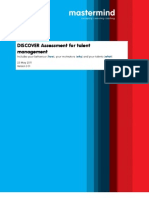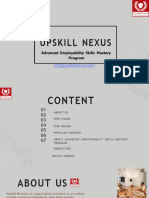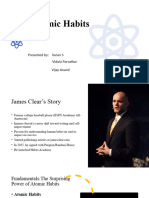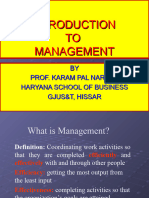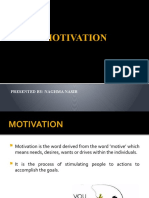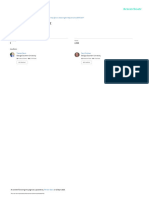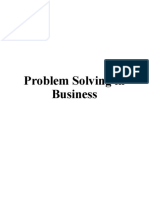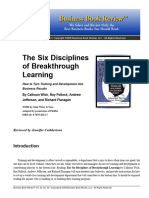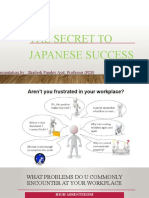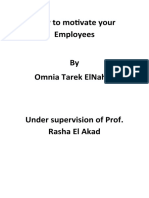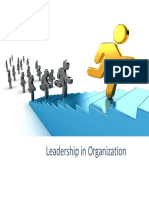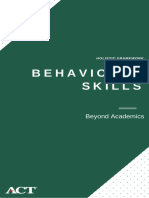100%(1)100% found this document useful (1 vote) 129 views21 pagesBehavioral Skills Ebook
Copyright
© © All Rights Reserved
We take content rights seriously. If you suspect this is your content,
claim it here.
Available Formats
Download as PDF or read online on Scribd
HOLISTIC FRAMEWORK
BEHAVIORAL
SKILLS
Beyond Academics
ACT are�4 KEYS TO COLLEGE AND
CAREER READINESS
Current gauges of college and career readiness tend to
focus on academic preparation and achievement, but
evidence shows that success in school and the
workplace is dependent on multiple aspects in addition
to academic ability.
Using ACT research, the ACT Holistic Framework
provides four domains (core academic skills, cross
cutting capabilities, behavioral skills, and education
and career navigation) that most effectively predict and
prepare someone's college and career readiness.
Students, and employees can use this framework as a
map to track themselves along their journey to
becoming college and career ready. Teachers and
employers can use this framework to identify times of
intervention or manage additional support for their
students or employees.�BENEFICIAL FOR ALL
K-12 Educators and Administrators
The behavioral skills found in this book are essential for
academic achievement and college readiness. In-school
and/or after-school activities can help students develop
these skills.
Postsecondary Professionals
The behavioral skills found in this book are what
research and workforce professionals have identified as
the skills needed for workforce readiness. A high level of
behavioral skills also ensures persistence and academic
success in your institution. Incorporating collaboration,
persistence, and extracurricular activities can help
improve these behavioral skills, creating a well-rounded,
work-ready individual.
Workforce Development Professionals
There may be a common perception among employers
that their employees or potential job candidates might be
missing the behavioral skills (i.e., soft skills) needed to
perform effectively in their organization. This discrepancy
might be due to a lack of consensus of what constitutes
behavioral skills. The components and subcomponents
found in this book can create a common language for
employers, improving how they define and measure the
presence of behavioral skills in their potential and
current employees.�TABLE OF CONTENTS
ACTING HONESTLY ...... 0c ccceeeeeeeneee
GETTING ALONG WITH OTHERS............+
KEEPING AN OPEN MIND .........200 000200
MAINTAINING COMPOSURE.............-++
SOCIALIZING WITH OTHERS. ........0+00005
SUSTAININGIERFORT shee eee ere
TAKEAWAYS
11
13
15
17
19�WHAT ARE THE
BEM AWHORAIL SIKHILILS 2�"SOFT SKILLS" OR
NON-COGNITIVE FACTORS
4°)
G€D
© @:
Acting Honestly: valuing and adhering to
ethical and moral standards of behavior,
as well as their personal level of humility
Keeping an Open Mind: curiosity about
a variety of ideas, beliefs, people, and
experiences
Maintaining Composure: working on
staying calm, serene, and able to
manage emotions effectively
Socializing with Others: preferred
level of social interaction, behavior in
interpersonal situations, and optimism
Getting Along with Others: interacting
positively and cooperating with others; is
kind, friendly, and tactful
Sustaining Effort: developing diligence,
effort, organization, self-control, and
compliance�ACTING
HONESTLY�The Components of
Acting Honestly
Genuineness:
Being sincere and truthful in interactions, appropriately
giving others credit, and acknowledging his or her
mistakes
Fairness:
Acting in ways that are intended to be unbiased and fair
to everyone
Modesty:
Being humble about achievements, presenting a
realistic view of himself or herself and avoiding boasting
or acting superior to others�KEEPING AN
OPEN MIND�The Components of Keeping
An Open Mind
Creativity:
Generating original ideas, using existing ideas or things
in new ways, and having an active imagination
Curiosity:
Seeking out information to better understand a wide
range of topic areas and/or obtaining a depth of
understanding in one topic area that goes beyond what
is required
Flexibility:
Adapting to new environments and making adjustments
to accommodates changes
Accepting Differences
Being open-minded and accepting of ideas, cultures,
and ways of doing things that are different from his or
her own
10�MAINTAINING
COMPOSURE
oan�The Components of
Maintaining Composure
Stress Tolerance:
The degree to which a person can control feelings of
anxiety and other negative emotions in order to function
effectively in a range of situations.
Self-Confidence
A tendency to be self-assured and to make decisions
without needing a lot of input from others.
12�SOCIALIZING WITH
OTHERS
13�The Components of
Socializing with Others
Assertiveness:
Influencing others and preferring to be in charge in
social interactions and group activities
Optimism:
The degree to which a person expresses a positive
mood and a positive outlook
Sociability
Seeking out and enjoying situations involving
interpersonal interaction and building relationships with
others.
14�GETTING ALONG
WITH OTHERS
15�The Components of
Getting Along with Others
Cooperation:
Being Respectful, polite, collaborative, and skilled at
working through conflict with other people
Perspective Taking:
Identifying, acknowledging, and understanding the
emotions of others, showing concern for others, and
considering the audience when providing information
Goodwill
Assuming others have good intentions to forgive and
not holding grudges
Helpfulness
Helping others and being generous with his or her time
and/or resources despite personal cost
—
Patience
Tolerating frustrations presented by others or by
situations without expressing irritation or hostility
16�SUSTAINING
EFFORT
awe�The Components of
Sustaining Effort
Dependability:
Reliability fulfilling responsibilities, meeting deadlines,
and producing quality work
Order:
Planning and organizing tasks and materials, creating
schedules, monitoring progress, and paying close
attention to details
Persistence:
Working hard, making progress on relevant tasks, and
maintaining focus despite setbacks or difficulties
Rule Consciousness:
Following rules and procedures and complying with
authority
Goal Striving:
Setting challenging goals, doing tasks without being
told, and working to improve or learn new skills
Self-Control
Managing impulses and weighing the consequences of
one's behavior before acting
18�TAKEAWAYS
19�Applying this to college and career readiness
A student's college and career readiness is strongly
dependent on the behavioral skills described in this
book. These skills predict important academic outcomes
like GPA and retention independent of, and in addition
to, traditional predictors such as demographics and
achievement test scores.
The relevance of these skills does not disappear upon
high school graduation. In college, they remain critical
predictors of grades and especially persistence and
on-time graduation. For example, developing a sense of
social belonging in college is a strong predictor of
retention. Part of a successful college experience is
becoming ready to enter the workforce, and students
must continue to develop these behavioral skills while in
college to achieve career readiness by graduation.
Once in the workforce, these skills predict a wide range
of outcomes, such as job performance, engaging in
ethical work conduct, teamwork, job satisfaction, and
perceived work stress. They are particularly important
over the long term, as these skills become more
predictive of job performance over time.
20�Tracking & Evaluating Skills
Where do you start? How do you measure and
integrate behavioral skills into your school or organization?
ACT is dedicated to helping develop and evaluate students
and employees using the behavioral domain of the Holistic
Framework.
ACT Engage® is a quick-and-easy
assessment measuring the attitudes
and behaviors found in this book. In
ACT just 30 minutes, you'll have a better
Engage’ idea of where your students stand and
how they can succeed. Use for
students in grades 6-9, 10-12, or in
college.
ACT Engage® Teacher Edition
ACT 82222 cai accompanies the Engage assessment
Teacher Edition and gives teachers and counselors the
ability to see and assess student
motivation, social engagement, and
self-regulation in an easy to follow report.
The ACT WorkKeys® Talent assessment
helps employers find and develop
AC C WorkKeys _&mployees by measuring work-related
attitudes and behaviors, focusing on the
personality traits found in this book.
21







